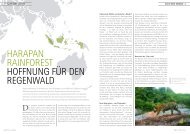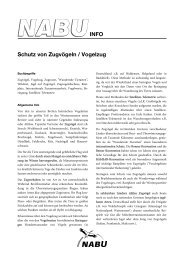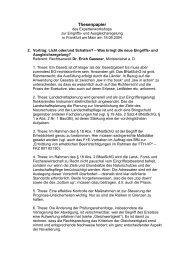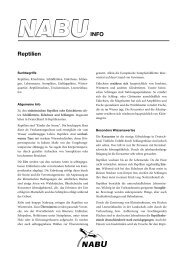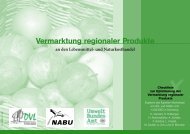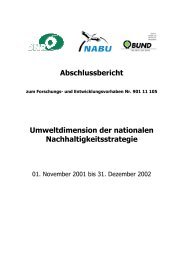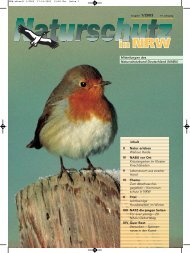Studie "The GMO-emperor has no clothes" (engl.) - Nabu
Studie "The GMO-emperor has no clothes" (engl.) - Nabu
Studie "The GMO-emperor has no clothes" (engl.) - Nabu
Create successful ePaper yourself
Turn your PDF publications into a flip-book with our unique Google optimized e-Paper software.
in government posts, or have become official<br />
advisors to governments. <strong>The</strong> regulated are<br />
becoming the regulators with predictable<br />
results—policies to safeguard the public are being<br />
eliminated or ig<strong>no</strong>red. <strong>The</strong> reports provide<br />
numerous illustrations of this revolving door<br />
influence.<br />
For example, in Argentina, representatives<br />
from biotech<strong>no</strong>logy corporations Monsanto,<br />
Syngenta, Bayer, Dow, and Pioneer sit on a<br />
prominent national panel that directly advises the<br />
government agency that decides about the release<br />
applications that these same companies submit.<br />
In the U.S., it is <strong>no</strong>w standard practice for<br />
biotech<strong>no</strong>logy firms to employ former members<br />
of Congress and Congressional and White<br />
House staff to give the industry an inside track.<br />
<strong>The</strong>re are many examples of former employees<br />
from biotech<strong>no</strong>logy corporations <strong>no</strong>w working<br />
in government—a senior advisor to the Food<br />
and Drug Administration (FDA) was a former<br />
lobbyist for Monsanto, the head of the main<br />
research arm for U.S. government agricultural<br />
research formerly worked for Danforth Plant<br />
Science Center (funded by Monsanto), and a<br />
former Monsanto employee is on the government<br />
committee tasked with legalizing GM salmon.<br />
A<strong>no</strong>ther main reason why many governments<br />
are opening the doors to <strong>GMO</strong>s is because of the<br />
far-reaching marketing and advertising influence<br />
of the industry.<br />
Just as the weavers in the Emperor tale repeatedly<br />
assured everyone that they were indeed weaving<br />
beautiful garments, biotech<strong>no</strong>logy corporations<br />
repeat stories of success over and over again until<br />
the message becomes the truth instead of actual<br />
experiences and outcomes.<br />
<strong>The</strong> recent “America’s Farmers Grow America”<br />
advertising campaign in the U.S. depicts<br />
Monsanto as being a friend to farmers and<br />
helping to grow the U.S. eco<strong>no</strong>my. “We are going<br />
to help tell their story. And it’s a great story to<br />
tell,” Monsanto says. But the hundreds of farmers<br />
being sued by Monsanto for alleged patent<br />
infringement and violation of tech<strong>no</strong>logy user<br />
agreements might have a different story to tell.<br />
In India, Monsanto’s advertising slogan is: “India<br />
delights as cotton farmers’ lives transform for the<br />
better.” But the widows of the more than 250,000<br />
farmer suicides in India related to GM cotton<br />
crop failures are certainly <strong>no</strong>t delighting.<br />
Marketing influences also include more subtle<br />
methods that include dispatching industry<br />
representatives to speak at everything from book<br />
fairs to private investor gatherings to a host of<br />
conferences for “future leaders,” “in<strong>no</strong>vators<br />
of tomorrow.” An example from Australia<br />
details marketing that goes far beyond subtle. In<br />
response to a moratoria on the sale of GM seed<br />
by some state governments, the industry quickly<br />
countered and developed a touring workshop<br />
geared for corporate executives entitled, “How to<br />
Beat Activists at <strong>The</strong>ir Own Game.” At one of<br />
the workshops, a speaker advised participants to<br />
“Take the moral high ground. …Tell politicians<br />
that when they support biotech<strong>no</strong>logy they<br />
are demonstrating much needed moral and<br />
political leadership. Conversely, you may want<br />
to point out the immorality of those who oppose<br />
biotech<strong>no</strong>logy.”<br />
Contamination/Illegal Plantings<br />
As many of country reports <strong>no</strong>te, GM seeds and<br />
crops frequently enter into regions via illegal<br />
plantings. In many instances, the biotech<strong>no</strong>logy<br />
industry <strong>has</strong> simply ig<strong>no</strong>red laws that prohibit<br />
<strong>GMO</strong>s, or GM seeds and plants are distributed to<br />
farmers via underground markets. Contamination<br />
is a<strong>no</strong>ther vehicle for spreading <strong>GMO</strong>s. <strong>The</strong><br />
similar experience in many countries is that once<br />
<strong>GMO</strong>s are found in a country—whether via<br />
contamination or illegal plantings—governments<br />
often use this to justify legalizing GM seeds and<br />
crops.<br />
In the report on India, Dr. Vandana Shiva sums<br />
up the experience of India that is repeated<br />
in country after country. “Either Monsanto<br />
blatantly violates the laws, or it <strong>has</strong> laws changed<br />
through its influence. It changes policies to<br />
privatise the seed and make farmers dependent<br />
on its seed mo<strong>no</strong>poly. It corrupts governments<br />
and policymakers. It corrupts k<strong>no</strong>wledge and<br />
science. It corrupts biodiversity through genetic<br />
contamination and genetic pollution.”<br />
Crop Failures/Effects on Farmers<br />
A<strong>no</strong>ther common refrain throughout the reports<br />
is that governments and industry promise farmers<br />
higher profits if they convert to GM seeds and<br />
crops, yet farmers are left on their own when<br />
failures come.<br />
This is the situation of Bt cotton’s introduction<br />
in South Africa’s Makhatini Flats. After five years,<br />
the majority of farmers growing Bt cotton are in<br />
debt and the number of farmers still growing the<br />
GM cotton <strong>has</strong> reduced by 80 percent.<br />
Similarly, Conalgodón, the Colombian federation<br />
29



